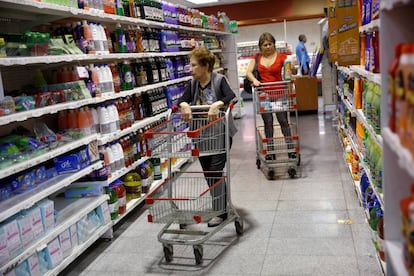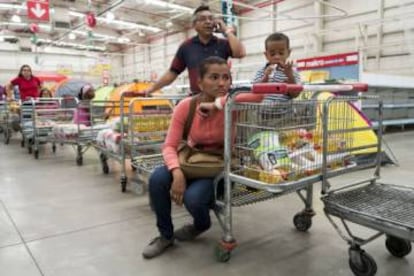The odyssey of paying in cash in Venezuela
New measure limits amount of money citizens may withdraw from the bank, as inflation rate soars
In many neighborhoods of Caracas, the streets are filled with people waiting their turn to buy food at exorbitant prices. They are not the only ones standing in lines throughout the Latin American country. On Tuesday of last week, groups of pensioners milled outside banks to collect their retirement checks with a view to Christmas.

Compounding their woes is a new decision by Venezuela’s banking sector supervisory agency. This body has issued an order to financial institutions, telling them to restrict cash withdrawals at bank windows and automated teller machines (ATMs).
Starting on December 1, customers may only take out up to 10,000 bolivars a day, equivalent to around US$5 on the black market. So far, there are no limits on money transfers or payments with debit cards.
Until now, it was possible to withdraw between 12,000 and 16,000 bolivars from ATMs, although in practice banks placed practically no limits on withdrawals.
This latest measure makes paying in cash in inflation-ridden Venezuela even more of an odyssey than it already was. Financial sector sources said that the decision is based on a fall in circulation of the 100-bolivar bill, the highest available denomination, which is used in nearly all transactions and is worth five cents of a US dollar as per the unofficial exchange rate.
It is hoped that the government will introduce higher-denomination bills by the end of this year
Two weeks ago, one dollar was worth 1,400 bolivars. This week, it could purchase 2,000 bolivars.
The move will make management of everyday life that much more strenuous for average Venezuelans. It is now possible to find a bigger selection of products in stores, often imported. But not everyone can afford them, and paying for them in cash is becoming impossible.
On Tuesday, when most citizens received their paycheck – there are typically two payments a month – the markets were busier than usual. But the problems remained the same.
Inside a supermarket in Chacao, a middle-class neighborhood in eastern Caracas, a cashier counted dozens of bills with uncommon speed. The customer, an elderly lady, had handed her seven packs of 1,000 bolivars each, all in 10-bolivar bills, to buy rice and tomato sauce. It was a rare scene – most establishments refuse to deal with such low denominations.
“They accept it in my case because they can see that I am elderly and ill,” said the lady, standing outside the supermarket after her purchase.

But bank customers are beginning to reject two, five and 10-bolivar notes, which barely buy anything these days. Besides being bulky, having to lug around large wads of cash can be dangerous for all parties involved. Many street vendors have adopted credit card terminals to avoid risks.
“I can’t go back home loaded with cash at night, in case I get mugged,” says Henry, a hot-dog seller who works in downtown Caracas. A regular hot-dog costs 700 bolivars; the special is 1,000. If someone wanted to pay in cash, they would have to hand over at the very least seven 100-bolivar notes. Or, worst-case scenario, 70 bills of the lowest denomination of 10 bolivars – although Henry would probably just refuse to take it.
Yet half of Venezuela’s population does not have a bank account, and certain sectors such as construction and domestic help are accustomed to dealing in cash. In inner parts of the country and in border areas, most services are still paid for with hard cash due to a widespread mistrust in electronic payment systems.
It is hoped that the government will progressively introduce higher-denomination bills by the end of this year. For years, economists have been warning about the need to do so, but President Nicolás Maduro has refused because it would mean accepting the reality of the rampant inflation that has been a hallmark of his tenure.
English version by Susana Urra.
Tu suscripción se está usando en otro dispositivo
¿Quieres añadir otro usuario a tu suscripción?
Si continúas leyendo en este dispositivo, no se podrá leer en el otro.
FlechaTu suscripción se está usando en otro dispositivo y solo puedes acceder a EL PAÍS desde un dispositivo a la vez.
Si quieres compartir tu cuenta, cambia tu suscripción a la modalidad Premium, así podrás añadir otro usuario. Cada uno accederá con su propia cuenta de email, lo que os permitirá personalizar vuestra experiencia en EL PAÍS.
¿Tienes una suscripción de empresa? Accede aquí para contratar más cuentas.
En el caso de no saber quién está usando tu cuenta, te recomendamos cambiar tu contraseña aquí.
Si decides continuar compartiendo tu cuenta, este mensaje se mostrará en tu dispositivo y en el de la otra persona que está usando tu cuenta de forma indefinida, afectando a tu experiencia de lectura. Puedes consultar aquí los términos y condiciones de la suscripción digital.








































